 BUY IT FROM AMAZON: RIGHT HERE!
BUY IT FROM AMAZON: RIGHT HERE!
PLATFORM: XBox 360 (reviewed), PS3, PC
PRICE: $59.99
ESRB RATING: M
DEVELOPER: Arkane Studios
PUBLISHER: Bethesda
I’d be lying if I said it wasn’t tempting early on to give Dishonored 4 stars sight unseen for being first person, but not being a military, space, or space military shooter. It’d be like showering praise on the first drink of leaden tap water when you’re tripping thirstballs in the middle of the Sahara. Nobody would ever blame you for doing so. But it’d also be a disservice. Dishonored‘s strengths lie far beyond what perspective its in. Its strengths are in the fact that the experience Arkane Studios has put in gamer hands is unlike anything we’ve seen on consoles this generation, and I’d be stunned if we ever got it again.
This *is* what ambition looks like, isn’t it? I haven’t seen it in a while, I’m trying to make sure.
THE PITCH
The Empress of Dunwall, one of several sea-faring nations in a larger kingdom, has been assassinated, her daughter Emily abducted, and the Empress’ trusted royal guardian, Corvo Attano, has been framed for her murder. Several years later, after Dunwall has been set upon by plague, poverty, and class warfare, Corvo is set free by the leaders of the loyalist movement, and given the tools–physical and supernatural–to exact revenge.
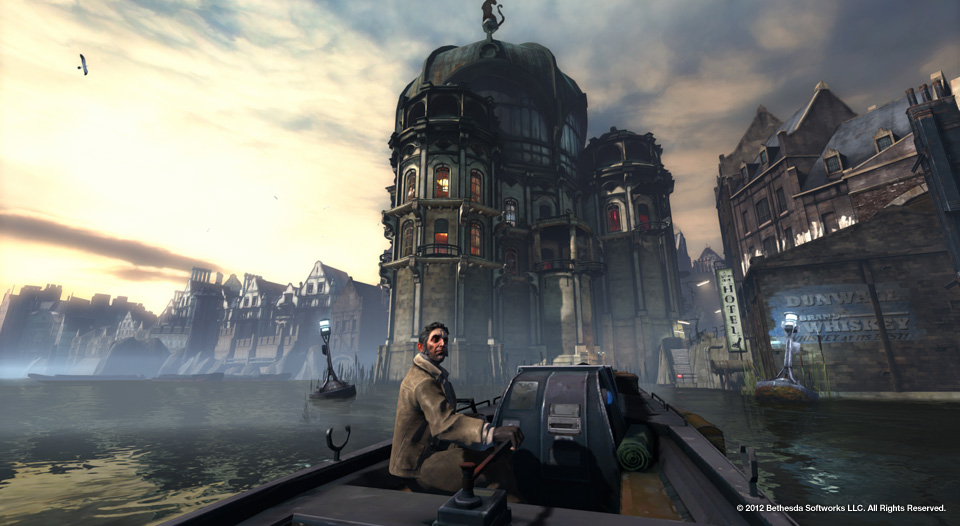
THE PLAY
There are plenty of people–myself included at one point–who are going to look at the Bethesda logo on the package here, and assume the game has common ancestry with Skyrim or Fallout. The first painfully linear, dungeon-crawling hour of gameplay will even reinforce this. This is a gaping mistake.
Instead, what you should be looking at is the list of developers. There’s an artistic brain trust here, made up of guys who worked on Bioshock, Half-Life 2, the Thief Series, led by the guy who made the first two Deus Ex titles. Once the game takes off the training wheels, that pedigree is far more obvious. Yes, at it’s heart, Dishonored is a stealth action game. You stalk prey from the shadows, strike when the time’s right, tidy up the pile of bodies as needed. Assassin’s Creed veterans will do well here, as the wheel-based inventory system, and weaponry all have the same feel; Deus Ex fans will at least be on familiar ground, as the way missions are laid out have the same open-ended, choose-your-own-tactic style of play that game lives and breathes on; By reputation, Thief fans will likely fare even better, since the stealth rips several pages out of that series’ playbook.
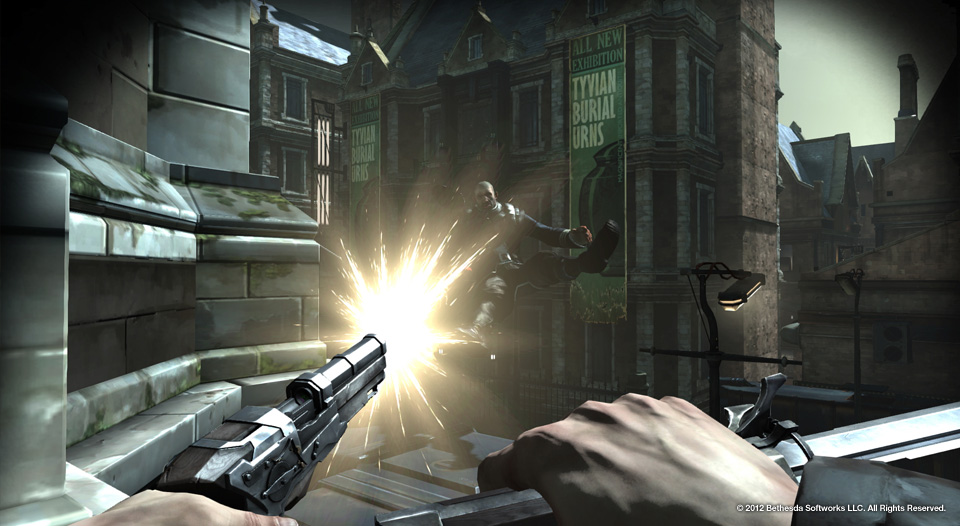
The “how” is one of a few areas where Dishonored shines above all three series. After your first contact with The Outsider, who totally isn’t Satan, at all, no really, Scout’s Honor, you’ll end up with two powers: Blink, which allows for teleportation, and Dark Vision, which allows you to see NPCs, their line of sight, and the freshly dead through walls, floors, and ceilings. You also get The Heart, a literal clockwork human heart that not only allows you to track down powerups in the current area, but also, in a non-essential but awesome touch, whispers to you the thoughts, deeds, and sins of anyone you point it at. And then, it turns you loose on a section of city to wreak havoc. Within seconds, the player ends up flinging themselves onto and across rooftops, listening to what the criminals banging on an old woman’s door have done in the past, waiting the few tense seconds until a guard decides to turn the other way, teleporting up to get the kill, or get put to sleep if you use the heart to read him and he’s a family man who just wants to get home safe today. On top of that, throw in a nice array of ranged weapons, crossbows, pistols, and grenades. It’s a satisfyingly original set of tweaks to formula, and such a fluid accessible system to get ahold of that, if this was all the game had to offer, I’d feel confident giving it the thumbs up.
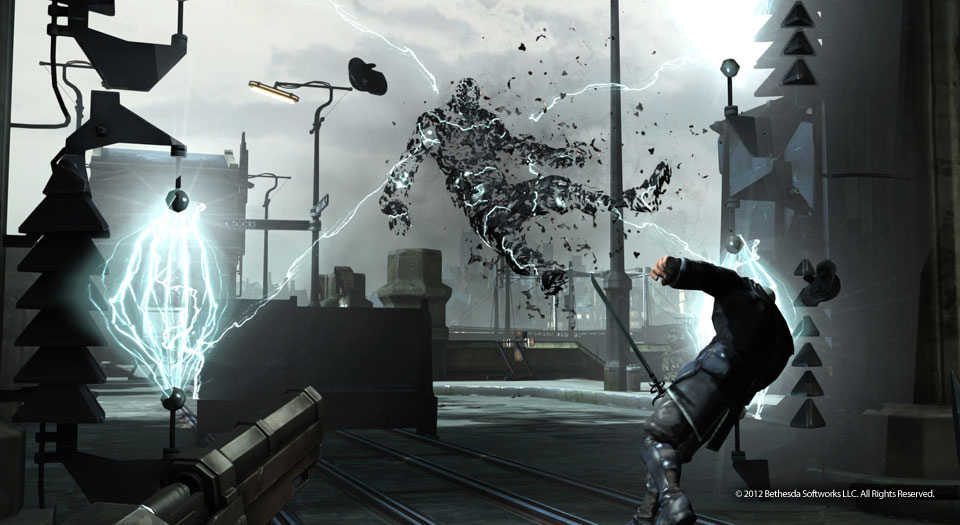
And then, once you start collecting and using your runes and bone charms to buy more abilities, the game ups the ante from crafty to shit-eating-grin wicked. You can strap a shrapnel bomb onto a rat’s back, then force the swarm to walk into an area full of hostiles, explode, then watch them feed on the remains and any stragglers to remove all traces it ever happened. Or stop time right before an enemy bullet hits, possess the shooter, and walk him into the path of his own bullet. To say nothing of the simple machine-hack options available, where an item allows you to rewire an area’s electric fence system to allow no one but you to pass, then leading the City Watch on a merry chase through it to get vaporized. And sure, you *could* Doom through the game, kill everything in your path until you reach your target, then fight your way through panicked, hyper-sensitive guards, and probably have a grand old time doing it. Hell, I’m even going to grant that the game is probably more challenging this way, and it doesn’t necessarily penalize you for trying (though the game world does react…). The playthrough where not a single person dies or even sees you has just as much merit as the kill-crazy rampage, and I can guarantee that my playthrough has zero resemblance to anyone else’s. Primarily because I have that heart out at all times, deciding whether guards deserve to live or die accordingly.
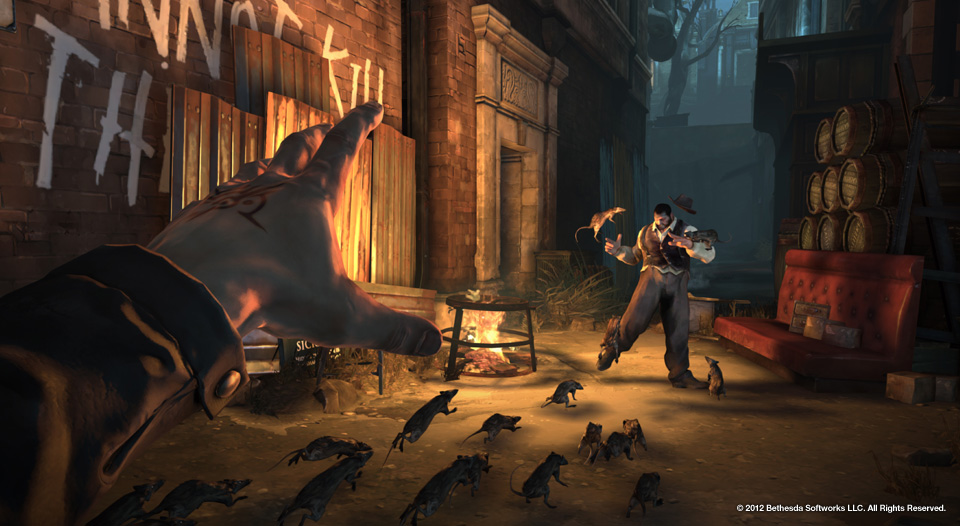
Point being, the game values, above all things, player finesse and creativity, not your aim. If there’s a complaint, it’s that taking out the actual major targets themselves don’t have nearly the pomp and circumstance they really should, unless you go the non-lethal route, and there’s situations where that just does not cut it, and times when it’s downright worse than death (see: the alternative to killing the correct Boyle sister). And even then, the journey being as strong as it is makes up for the emptiness of the intended finish. The more willing the player is to improvise, they will find the game world is their oyster. Dishonored isn’t a completely open world experience, but more than anything I’ve played of its ilk, the game does a fantastic job of making the player feel like it is.
THE PRESENTATION
It’s good to know that it’s still possible to milk Unreal Engine 3’s teat this far into the current console lifecycle and still get something that looks and sounds this great out of it. Much of that can be laid at the feet of the beautiful art design, though, marrying Victorian opulence with dystopian future, and chill-inducing squalor from the writing to the architecture and everything between. It’s easy to apply the steampunk label to a lot of the antiquated futurism on display, but there’s a sterility to most steampunk that does not exist here. Dunwall feels like a wide, lived-in/died-in world on its last legs. It’s not laid waste by invasion or mass destruction, but sickness and sheer neglect. While traveling its streets, reading its books, and listening to its people, Dunwall has more than a few moments of horror and disgust, but it’s also a marvel of world-building.
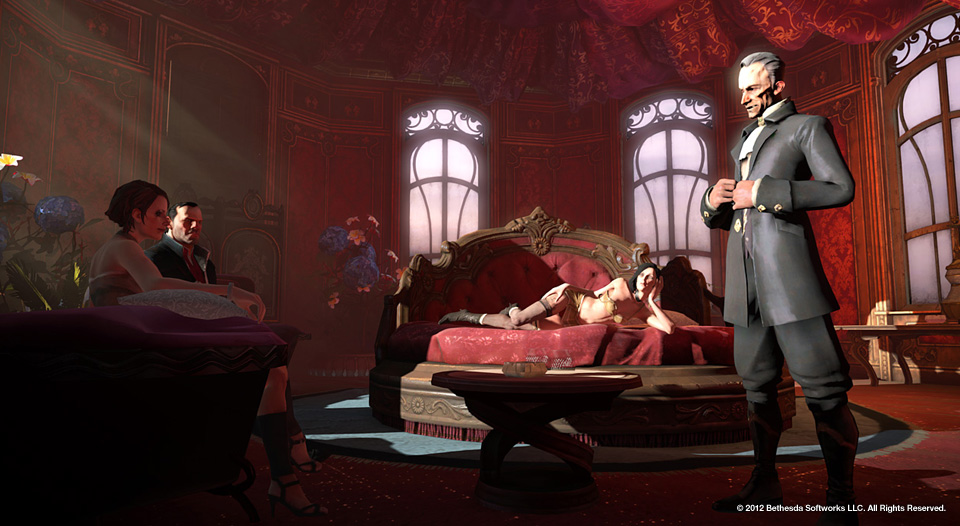
This, however, makes the story a bit harder to judge. Strip away the elaborate dressing, what you’re left with is a basic revenge tale, with some elementary political machinations for flavor. Assassin’s Creed‘s been playing in that particular murky pool for some time, and yet it flies on the strength of the characters and the legacy they’ve been crafting for Ezio Auditore this whole time. Dishonored does much the same, betting the farm on the idea that a revenge tale in this particular world, with these particular stakes would sustain a game over 15-20 hours, and they are luckily right. The game steadily becomes less about revenge and politics, but the battle for souls; Corvo’s, his young charge, and the city’s. More violence and chaos and terror will ultimately lead to changes between stages, where, at its darkest, people are frightened of strangers, rats are legion, your “handlers” as it may begin to question your methods, and Emily learns harsh lessons on how to rule such a place in her mother’s stead. This is the stuff that explains why Bethesda blew the money on getting such an eclectic, varied cast of voice actors together for key roles. The subtle shifts in performances as Corvo returns home either with more or less blood on his hands are great, and makes the player running around talking to everyone with a “Talk” option an imperative. It’s not that justified across the board, mind you–Lena Headey gets a thankless babysitter role, and unless you make an oddly unnecessary decision halfway through, you might not hear poor Carrie Fisher at all–but John Slattery and Chloe Moretz alone do commanding work that bolsters every decision you make as Corvo. The story is indeed ordinary, but nothing that goes on in Dunwall could ever be called that.
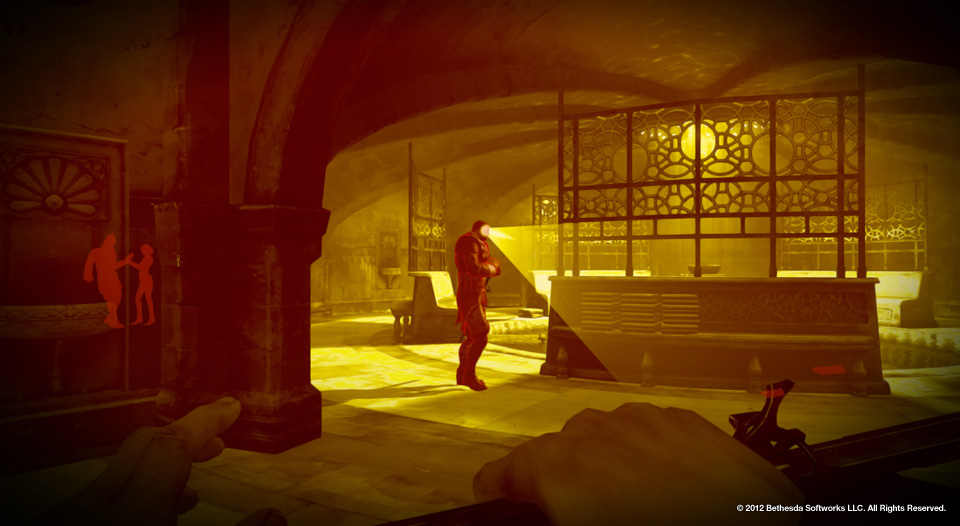
THE REPLAY
Whenever a developer talks about no two playthroughs ever being the same, he’s talking about random dungeons. Dishonored is talking about random players. There’s so many approaches to even the smallest tasks that a second playthrough would almost be like remaking the entire game. Combine that with the promise that DLC is coming, and you’ve got a game that should make itself at home, because it’s not going anywhere away from your shelf.
THE VERDICT
I’d been waiting for the next benevolent act in first-person action ever since Mirror’s Edge, and Dishonored‘s city of Dunwall is most definitely that. Corvo Attano’s tale isn’t necessarily the be-all, end-all of stories to tell in this world Arkane Studios has created here, and I don’t want it to be. What I do want is to feel the kind of freedom of player choice we’ve been given here, and be given as compelling, unique, and fascinating a collection of reasons to take full advantage of it. As long as those two things remain rare treats in gaming instead of the norm, Dishonored will represent a ridiculously high benchmark for its genre.
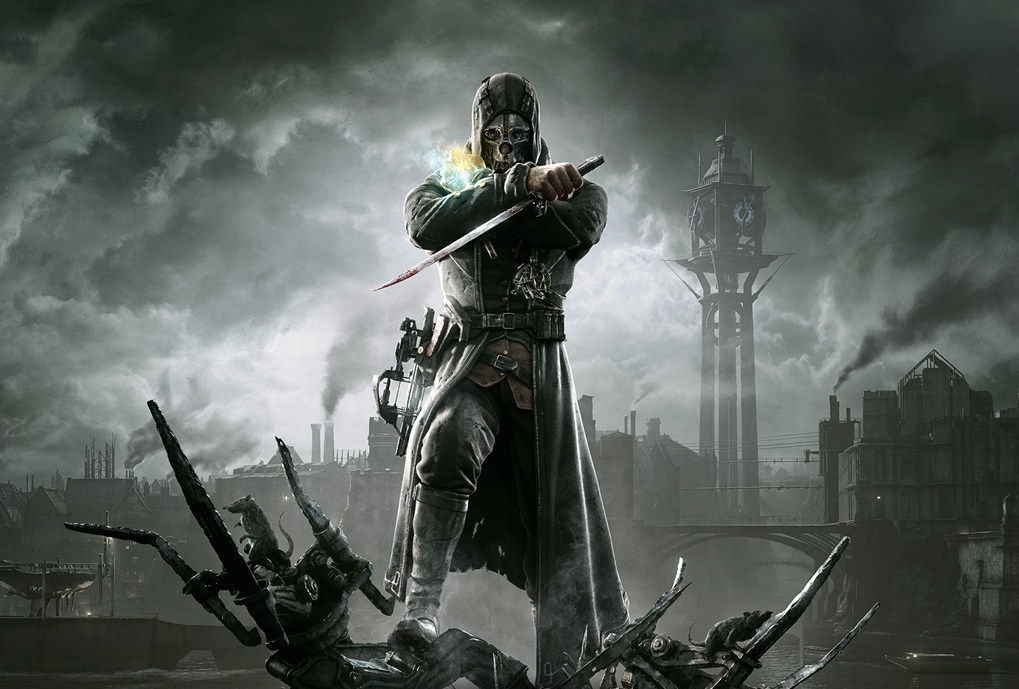





out of 5
